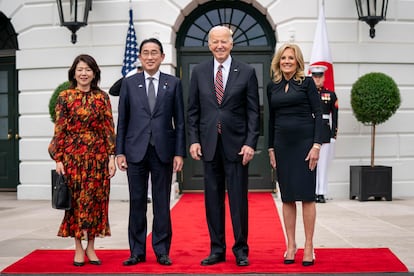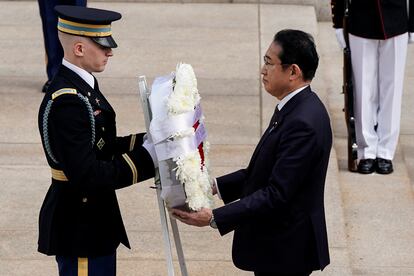The US and Japan reinforce their military alliance to counter the growing weight of China
Biden and Japanese PM Fumio Kishida are meeting this week in Washington, which will also host the leader of the Philippines, Ferdinand Marcos Jr, to show America’s support following pressure from Beijing on Manila


If the geopolitical strategy of the Biden administration had to be summarized in a single principle, it could well be to “prepare alliances for new challenges,” be they the rise of China, the aggressiveness of Russia or the nuclear threat from North Korea. And in these preparations, Japan is a fundamental ally. Washington is making it clear this week with a quasi-state visit by Japanese Prime Minister Fumio Kishida in which the military alliance and the collaboration of the respective defense industries will be reinforced, and which will end with an unprecedented trilateral meeting with the Philippines.
The three countries have “objectives, interests and — truth be told— strategic concerns that are increasingly converging in areas such as the South China Sea,” said White House National Security Communications Advisor John Kirby in a conversation with journalists on Monday. “We will try to find ways to deepen the collaboration with our closest partners to ensure a free, open, prosperous and secure Indo-Pacific region.”
Kishida arrived in the United States on Monday with his wife, Yuko, for a four-day visit in which he will receive the highest level of attention possible. It is not officially a state visit, since he is not the top leader of his country — Emperor Naruhito is — but he will be offered a state dinner at the White House with nearly 200 guests on Wednesday, and on Thursday he will deliver a speech before both houses of Congress. The Japanese flags to welcome him are already decorating the streetlights of the main avenues in Washington D.C.
On Wednesday the Japanese prime minister, who is running for re-election in September as leader of his party, the conservative Liberal Democratic Party, will also participate in a welcome ceremony at the White House and, after a meeting with President Joe Biden, both leaders will hold a joint press conference.

The link with Tokyo “is the most important bilateral relationship in the Indo-Pacific,” according to Chris Johnstone, an expert analyst on Japan at the Center for Strategic & International Studies (CSIS) in Washington.
Both countries share deep suspicions about the rise of China and the giant’s growing influence in the Asia Pacific. Tokyo is a fundamental player in that region and increasingly active in the rest of the world. Japan is also further removed from the official pacifist policy that it adopted in the post-war period: it has been modernizing its armed forces for a decade, and has promised to double its defense budget to reach 2% of GDP. In addition, it is the cornerstone of the network of mini-economic and security alliances that the United States has woven in Asia to counteract China’s strength, from the Quad (U.S., Japan, Australia, and India) to the U.S.-Japan-South Korea trilateral ties, and the Indo-Pacific Economic Framework (IPEF).
During Kishida’s visit, the two allies plan to further strengthen their partnership, senior U.S. officials have said. Deputy Secretary of State Kurt Campbell indicated last week at an event that these plans include steps for collaboration and coordination of their defense industrial policies, with the aim of jointly developing, and in the future facilitating co-production of, leading defense teams.
Japan is emerging as a possible base for shipyards and munitions production, including Patriot missile defense systems that could be re-exported to Ukraine.
“The war in Ukraine has highlighted the importance of [developing] a joint capability between allies as a fundamental part of deterrence and our collective combat capability. It is part of a broader issue for the United States to allow greater and easier cooperation in technology and defense with our closest partners, because we need it,” says Johnstone.
Collaboration with Aukus
On Monday, the three members of the military alliance known as Aukus (Australia, the United Kingdom, and the United States) announced that they are considering collaborating with Tokyo in its so-called Pillar II, the joint development of strategic weapons in areas such as artificial intelligence, submarine warfare, or hypersonic equipment.
“There is broad consensus that Japan should be one of the first partners, if not the first, to be included as part of an expanded effort on specific projects,” Johnstone said. But senior U.S. officials stress that before deeper integration, Japan must resolve issues such as a stronger cyber defense or tougher legislation on top secret information.
The two countries will also strengthen and update their bilateral military alliance, signed after the end of World War II, to allow them to respond more agilely to the threats they perceive from China and, increasingly, from North Korea, and Beijing’s harassment of the democratically governed island of Taiwan, which China considers part of its territory. Biden and Kishida are expected to announce steps to strengthen the exchange of information and improve the coordination of their commands, although without reaching the level of the U.S.-South Korea alliance, where the forces of both countries are managed by a joint command.
“If we think about North Korea’s provocations, the nuclear threats, China’s maritime assertiveness and that country’s broader military buildup, this is a natural step in the development of the alliance that will contribute to the deterrent effect,” according to the CSIS expert.
On Thursday, Biden will also host Ferdinand Marcos Jr., the president of the Philippines, for the second time in just over a year, before holding a trilateral meeting that will focus on Beijing’s growing pressure on Manila in the South China Sea, where both governments maintain a bitter territorial dispute. The trilateral forum, the first among these partners, “sends an unequivocal signal that both Washington and Tokyo are on Manila’s side in the face of Beijing’s growing maritime aggression,” says Lisa Curtins, director of the Indo-Pacific Security Program at the Center for a New American Security (CNAS). The Philippines, after the rapprochement with Beijing favored during the administration of Rodrigo Duterte, has increasingly entered the orbit of American alliances in the Marcos era.
“Close cooperation between Japan, the United States and the Philippines is essential for an open and free order, based on the rule of law, and for the economic prosperity of the region,” the prime minister declared last Friday.
But not everything will be smiles and flattery at the meetings between American representatives and their Japanese counterparts. Standing between the two are the aspirations of the Japanese company Nippon Steel to acquire U.S. Steel for $15 billion, a plan that has been criticized by both President Biden and the Republican presidential candidate Donald Trump. Kishida’s trip also seeks to reinforce Japan’s position in the face of a hypothetical victory for Trump at the November election, given the possibility that the former president could demand greater investments in defense from Tokyo or try to seek a pact with China that could destabilize the Asia Pacific region.
Sign up for our weekly newsletter to get more English-language news coverage from EL PAÍS USA Edition
Tu suscripción se está usando en otro dispositivo
¿Quieres añadir otro usuario a tu suscripción?
Si continúas leyendo en este dispositivo, no se podrá leer en el otro.
FlechaTu suscripción se está usando en otro dispositivo y solo puedes acceder a EL PAÍS desde un dispositivo a la vez.
Si quieres compartir tu cuenta, cambia tu suscripción a la modalidad Premium, así podrás añadir otro usuario. Cada uno accederá con su propia cuenta de email, lo que os permitirá personalizar vuestra experiencia en EL PAÍS.
¿Tienes una suscripción de empresa? Accede aquí para contratar más cuentas.
En el caso de no saber quién está usando tu cuenta, te recomendamos cambiar tu contraseña aquí.
Si decides continuar compartiendo tu cuenta, este mensaje se mostrará en tu dispositivo y en el de la otra persona que está usando tu cuenta de forma indefinida, afectando a tu experiencia de lectura. Puedes consultar aquí los términos y condiciones de la suscripción digital.








































